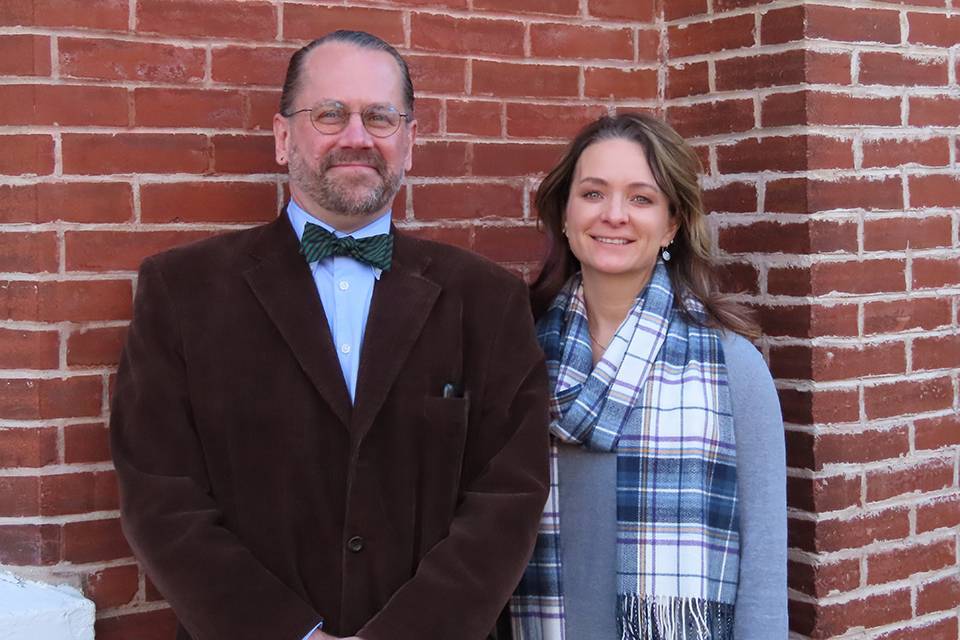Saint Louis University Forms Missouri’s First Addiction Medicine Fellowship
Maggie Rotermund
Senior Media Relations Specialist
maggie.rotermund@slu.edu
314-977-8018
Reserved for members of the media.
ST. LOUIS – Saint Louis University School of Medicine is tackling the country’s opioid abuse crisis by training community physicians to recognize and treat addictions. SLU has created Missouri’s first addiction medicine fellowship.
The addiction medicine fellowship is among the first in the country, as the American College of Graduate Medical Education only certified addiction medicine fellowships in 2018.
SLU’s first fellow, Kate Austman, M.D., began work in January. By next year, program director Fred Rottnek, M.D., a professor of family and community medicine at SLU, hopes to double the number of fellows.
Fellows will do rotations at SSM Health Saint Louis University Hospital and SSM Health St. Mary’s Hospital, as well as in clinics and community health centers. While at St. Mary’s, fellows will work with Jaye Shyken, M.D., the associate program director for the fellowship, at the WISH Center. WISH treats women with addiction issues throughout their pregnancies and the post-partum period.
“Our setup is unique,” Rottnek said. “The fellows will complete core rotations in family medicine, psychiatry, maternal/fetal health and telehealth. The rotations are typically two months each, but every Thursday will be spent either at the WISH Center or at ARCA (Assisted Recovery Centers of America).”
Rottnek said by working with ARCA, SLU will be able to help 15 agencies at more than 30 sites across the state.
“We provide the medication management piece while the home agencies provide wrap-around services,” he said. “With telehealth, we can address some of these urgent needs faster.”
The First Fellow
Austman is a family medicine doctor from Gibson City, Illinois. She said watching the opioid crisis hit her community led her to seek out additional training.
“It started when I started to see moms with heroin addictions come in. The closest methadone clinic is about an hour from us,” she said.
She did a short fellowship at Rush University in 2018 that included immersion weekends and webinars. Wanting more, she met Shyken, who is a professor of obstetrics, gynecology and women’s health and a SLUCare gynecologist, at a conference and Shyken suggested Austman apply for SLU’s newly-created fellowship.
“At that point, I thought there was no way I could do this – I was too busy,” Austman said. “But after another conference last July I told my husband that I can’t stop thinking about doing this.”
SLU’s fellowship allows Austman to refresh her skills as a physician while bringing added value to her 20-bed community hospital and patients back home. With the support of her administration and her family, she found an apartment in St. Louis where she stays during the week.
She heads back to the family farm each weekend to see her husband and two of her children. Her oldest is a freshman at Colorado State University.
“I talk with my staff every day and there is a physician assistant and another doctor coming in to help out,” she said. “I’m also still running a clinic (in Illinois) once a month.”
Rottnek said he was thrilled to get a physician of Austman’s caliber and experience as SLU’s first fellow.
“We knew that we wanted to start with someone in the region, so that we could build partnerships through this work,” he said. “I was extremely happy to get Kate here.”
And Austman was happy to return – she got her undergraduate degree from SLU. “I loved it here.”
Creating Community Change
One of the benefits to this addiction fellowship, Rottnek said, is the chance to support early career physicians in smaller, more rural hospitals who see a high volume of opioid use disorder patients, but maybe haven’t had the opportunity to see the newest, best practices used in an academic medical setting.
“This is hard work – it’s messy, patient-centered medicine,” Rottnek said. “We are hoping to create opportunities for physicians to come here for training and go back and champion best practices to their colleagues.”
“We need to change the culture,” Austman said. “By normalizing these conversations we can help provide our patients with the care they need.”
Applications are being accepted for fellows to begin July 1. Funding for the fellowship comes from SLU, the Missouri Foundation for Health, SSM Health and the State Opioid Response program through the Missouri Department of Mental Health.
The program is open to any board-certified and board-eligible physician. Rottnek said that he hopes to see specialists from pediatrics to geriatrics apply to learn more about addiction medicine.
“This is an area of excellence for SLU,” he added. “It’s a shame that there is such a need for this, but SLU is so supportive of this work. Our fellowship complements current training programs with graduate students in medical family therapy, psychology and social work. Folding in peer support specialists links campus to community – the approach we need to create a workforce our communities need.”
Established in 1836, Saint Louis University School of Medicine has the distinction of awarding the first medical degree west of the Mississippi River. The school educates physicians and biomedical scientists, conducts medical research, and provides health care on a local, national and international level. Research at the school seeks new cures and treatments in five key areas: infectious disease, liver disease, cancer, heart/lung disease, and aging and brain disorders.


















